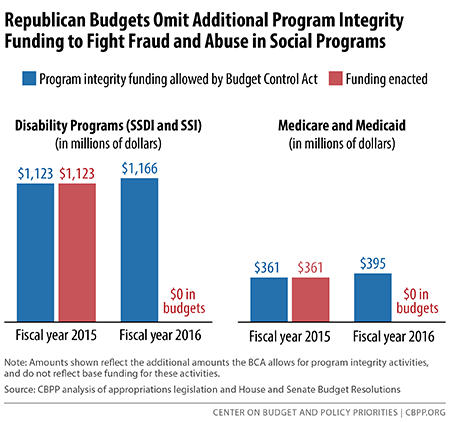BEYOND THE NUMBERS
Despite Anti-Fraud Rhetoric, Republican Budgets Omit Funding to Combat Fraud and Abuse
Update, April 13: We’ve updated this post to reflect more recent information.
The budgets that the House and Senate will consider this week leave out the funding that the 2011 Budget Control Act (BCA) specifically allows for “program integrity” activities to fight fraud and abuse in Medicare, Medicaid, and disability programs, despite the fact that these activities have a proven track record of saving money. This action stands in contrast to Republican claims that their budgets will make government spending more “efficient and effective.”
Both the House and Senate budgets fail to include the $1.166 billion in additional funding the BCA sanctions in 2016 for reducing overpayments and fraud in the Social Security Disability Insurance and Supplemental Security Income (SSI) programs, and the $395 million for combatting Medicare and Medicaid fraud. Congress provided the allowed amounts for fiscal year 2015 — $1.123 billion to combat fraud and overpayments in the disability programs and $361 million to address Medicare and Medicaid fraud — but under the new House and Senate budgets, this funding would end.
These program integrity activities have been found to save substantial sums, reduce program costs, and thereby lower budget deficits. For example, a key use of program integrity funding for Social Security and SSI is to conduct “continuing disability reviews” to weed out beneficiaries who have recovered from their impairments. The Social Security actuaries have found that these reviews save about $10 for every $1 they cost.
Similarly, program integrity activities to detect and stop erroneous payments and outright fraud in Medicare and Medicaid (including payments to doctors and hospitals that improperly bill or overbill the programs) saved about $8 for each dollar spent on such efforts in 2012-2014.
The funds in question are the amounts the BCA specifically allows for designated program integrity activities with a proven track record of saving money. Because these activities yield savings significantly exceeding their cost, the BCA allows specified amounts for these program integrity efforts that don’t count against the BCA’s austere appropriations caps.
The House budget expresses support for program integrity activities but states that they must be funded within the caps — meaning that fully funding them would require even deeper cuts in other non-defense discretionary programs, which already must adhere to the austere sequestration levels in 2016. And after 2016, the House budget proposes to cut non-defense discretionary programs below sequestration levels, leaving even less room for program integrity funding.
Many Republican lawmakers have been vocal in criticizing various programs for people who have disabilities or low-income families by charging that the programs are marked by fraud and abuse. This can make good political and campaign rhetoric. Now comes the question: will they put their money where their mouths are?
Even if the budget resolutions do not include these additional funds, the Appropriations Committees may still be able to provide them when they write the annual appropriations bills. That would be the right thing to do.

